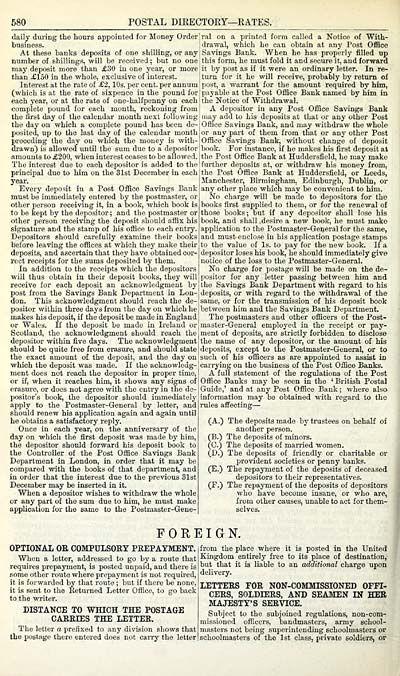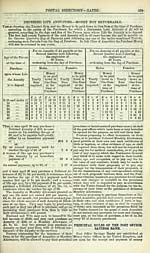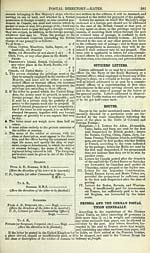Download files
Complete book:
Individual page:
Thumbnail gallery: Grid view | List view

580
POSTAL DIRECTORY— RATES.
daily during the hours appointed for Money Order
business.
At these banks deposits of one shilling, or any
number of shillings, -will be received; but no one
may deposit more than £30 in one year, or more
than £150 in the whole, exclusive of interest.
Interest at the rate of £2, 10s. per cent, per annum
(which is at the rate of sixpence in the pound for
each year, or at the rate of one-halfpenny on each
complete pound for each month, reckoning from
the first day of the calendar month next following
the day on which a complete pound has been de-
posited, up to tlie last day of the calendar month
preceding the day on which the money is with-
drawn) is allowed until the sum due to a depositor
amounts to £200, when interest ceases to be allowed.
The interest due to each depositor is added to the
principal due to him on the 31st December iu each
year.
Every deposit in a Post Office Savings Bank
must be immediately entered by the postmaster, or
other person receiving it, in a book, which book is
to be kept by the depositor ; and the postmaster or
other person receiving the deposit should affix his
signature and the stamp of his office to each entry.
Depositors should carefully examine their books
before leaving the offices at which they make their
deposits, and ascertain that they have obtained cor-
rect receipts for the sums deposited by them.
In addition to the receipts which the depositors
will thus obtain in their deposit books, they will
receive for each deposit an acknowledgment by
post fi'om the Savings Bank Department in Lon-
don. This acknowledgment should reach the de-
positor within three days from the day on which he
makes his deposit, if the deposit be made in England
or Wales. If the deposit be made in Ireland or
Scotland, the acknowledgment should reach the
depositor within five days. The acknowledgment
should be quite free from erasure, and should state
the exact amount of the deposit, and the day on
which the deposit was made. If the acknowledg-
ment does not reach the depositor in proper time,
or if, when it reaches him, it shows any signs of
erasure, or does not agree with the entry in the de-
positor's book, the depositor should immediatelj'
apply to the Postmaster-General by letter, and
should renew his application again and again until
he obtains a satisfactory reply.
Once in each year, on the anniversary of the
day on which the first deposit was made by him,
the depositor should forward his deposit book to
the Controller of the Post Office Savings Bank
Department in London, in order that it may be
compared with the books of that department, and
in order that the interest due to the previous 31st
December may be inserted in it.
When a depositor wishes to withdraw the whole
or any part of the sum due to him, l)e must make
application for the same to the Postmaster-Gene-
ral on a printed form called a Notice of With-
drawal, which he can obtain at any Post Office
Savings Bank. When he has properly filled up
this form, he must fold it and secure it, and forward
it by post as if it were an ordinary letter. In re-
turn for it he will receive, probably by return of
post, a warrant for the amount required by him,
payable at the Post Office Bank named by him in
the Notice of Withdrawal.
A depositor in any Post Office Savings Bank
may add to his deposits at that or any other Post
Office Savings Bank, and may withdraw the whole
or any part of them from that or any other Post
Office Savings Bank, without change of deposit
book. For instance, if he makes his first deposit at
the Post Office Bank at Huddersfield, he may make
further deposits at, or withdraw his money from,
the Post Office Bank at Huddersfield, or Leeds,
Manchester, Birmingham, Edinburgh, Dublin, or
any other place which may be convenient to him.
No charge will be made to depositors for the
books first supplied to them, or for the renewal of
those books ; but if any depositor shall lose his
book, and shall desire a new book, he must make
application to the Postmaster-General for the same,
and must enclose iu his application postage stamps
to the value of Is. to pay for the new book. If a
depositor loses his book, he should immediately give
notice of the loss to the Postmaster-General.
No charge for postage will be made on the de-
positor for any letter passing between him and
the Savings Bank Department with regard to his
deposits, or with regard to the withdrawal of the
same, or for the transmission of his deposit book
between him and the Savings Bank Department.
The postmasters and other officers of the Post-
master-General employed in the receipt or pay-
ment of deposits, are strictly forbidden to disclose
the name of any depositor, or the amount of his
deposits, except to the Postmaster-General, or to
such of his officers as are appointed to assist in
carrying on the business of the Post Office Banks.
A full statement of the regulations of the Post
Office Banks may be seen in the ' British Postal
Guide,' and at any Post Office Bank ; where also
information may be obtained with regard to the
rules affecting —
(A.) The deposits made bj' trustees on behalf of
another person.
(B.) The deposits of minors.
(0.) The deposits of married women.
(D.) The deposits of friendly or charitable or
provident societies or penny banks.
(E.) The repayment of the deposits of deceased
depositors to their representatives.
(F.) The repayment of the deposits of depositors
who have become insane, or who are,
from other causes, unable to act for them-
selves.
FOREIGN.
OPTIONAL OE COMPULSORY PREPAYMENT.
When a letter, addressed to go by a route that
requires prepayment, is posted unpaid, and there is
some other route where prepayment is not required,
it is forwarded by that route ; but if there be none,
it is sent to the Returned Letter Office, to go back
to the writer.
DISTANCE TO WHICH THE POSTAGE
CARRIES THE LETTER.
The letter n prefixed to auy division shows that
the postage then; entered does not carry the letter
from the place where it is posted in the United
Kingdom entirely free to its place of destination,
but that it is liable to an additional charge upon
delivery.
LETTERS FOR NON-COMMISSIONED OFFI-
CERS, SOLDIERS, AND SEAMEN IN HER
MAJESTY'S SERVICE.
Subject to the subjoined regulations, non-com-
missioned officers, bandmasters, army school-
masters not being superintending schoolmasters or
schoolmasters of the 1st class, private soldiei-s, or
POSTAL DIRECTORY— RATES.
daily during the hours appointed for Money Order
business.
At these banks deposits of one shilling, or any
number of shillings, -will be received; but no one
may deposit more than £30 in one year, or more
than £150 in the whole, exclusive of interest.
Interest at the rate of £2, 10s. per cent, per annum
(which is at the rate of sixpence in the pound for
each year, or at the rate of one-halfpenny on each
complete pound for each month, reckoning from
the first day of the calendar month next following
the day on which a complete pound has been de-
posited, up to tlie last day of the calendar month
preceding the day on which the money is with-
drawn) is allowed until the sum due to a depositor
amounts to £200, when interest ceases to be allowed.
The interest due to each depositor is added to the
principal due to him on the 31st December iu each
year.
Every deposit in a Post Office Savings Bank
must be immediately entered by the postmaster, or
other person receiving it, in a book, which book is
to be kept by the depositor ; and the postmaster or
other person receiving the deposit should affix his
signature and the stamp of his office to each entry.
Depositors should carefully examine their books
before leaving the offices at which they make their
deposits, and ascertain that they have obtained cor-
rect receipts for the sums deposited by them.
In addition to the receipts which the depositors
will thus obtain in their deposit books, they will
receive for each deposit an acknowledgment by
post fi'om the Savings Bank Department in Lon-
don. This acknowledgment should reach the de-
positor within three days from the day on which he
makes his deposit, if the deposit be made in England
or Wales. If the deposit be made in Ireland or
Scotland, the acknowledgment should reach the
depositor within five days. The acknowledgment
should be quite free from erasure, and should state
the exact amount of the deposit, and the day on
which the deposit was made. If the acknowledg-
ment does not reach the depositor in proper time,
or if, when it reaches him, it shows any signs of
erasure, or does not agree with the entry in the de-
positor's book, the depositor should immediatelj'
apply to the Postmaster-General by letter, and
should renew his application again and again until
he obtains a satisfactory reply.
Once in each year, on the anniversary of the
day on which the first deposit was made by him,
the depositor should forward his deposit book to
the Controller of the Post Office Savings Bank
Department in London, in order that it may be
compared with the books of that department, and
in order that the interest due to the previous 31st
December may be inserted in it.
When a depositor wishes to withdraw the whole
or any part of the sum due to him, l)e must make
application for the same to the Postmaster-Gene-
ral on a printed form called a Notice of With-
drawal, which he can obtain at any Post Office
Savings Bank. When he has properly filled up
this form, he must fold it and secure it, and forward
it by post as if it were an ordinary letter. In re-
turn for it he will receive, probably by return of
post, a warrant for the amount required by him,
payable at the Post Office Bank named by him in
the Notice of Withdrawal.
A depositor in any Post Office Savings Bank
may add to his deposits at that or any other Post
Office Savings Bank, and may withdraw the whole
or any part of them from that or any other Post
Office Savings Bank, without change of deposit
book. For instance, if he makes his first deposit at
the Post Office Bank at Huddersfield, he may make
further deposits at, or withdraw his money from,
the Post Office Bank at Huddersfield, or Leeds,
Manchester, Birmingham, Edinburgh, Dublin, or
any other place which may be convenient to him.
No charge will be made to depositors for the
books first supplied to them, or for the renewal of
those books ; but if any depositor shall lose his
book, and shall desire a new book, he must make
application to the Postmaster-General for the same,
and must enclose iu his application postage stamps
to the value of Is. to pay for the new book. If a
depositor loses his book, he should immediately give
notice of the loss to the Postmaster-General.
No charge for postage will be made on the de-
positor for any letter passing between him and
the Savings Bank Department with regard to his
deposits, or with regard to the withdrawal of the
same, or for the transmission of his deposit book
between him and the Savings Bank Department.
The postmasters and other officers of the Post-
master-General employed in the receipt or pay-
ment of deposits, are strictly forbidden to disclose
the name of any depositor, or the amount of his
deposits, except to the Postmaster-General, or to
such of his officers as are appointed to assist in
carrying on the business of the Post Office Banks.
A full statement of the regulations of the Post
Office Banks may be seen in the ' British Postal
Guide,' and at any Post Office Bank ; where also
information may be obtained with regard to the
rules affecting —
(A.) The deposits made bj' trustees on behalf of
another person.
(B.) The deposits of minors.
(0.) The deposits of married women.
(D.) The deposits of friendly or charitable or
provident societies or penny banks.
(E.) The repayment of the deposits of deceased
depositors to their representatives.
(F.) The repayment of the deposits of depositors
who have become insane, or who are,
from other causes, unable to act for them-
selves.
FOREIGN.
OPTIONAL OE COMPULSORY PREPAYMENT.
When a letter, addressed to go by a route that
requires prepayment, is posted unpaid, and there is
some other route where prepayment is not required,
it is forwarded by that route ; but if there be none,
it is sent to the Returned Letter Office, to go back
to the writer.
DISTANCE TO WHICH THE POSTAGE
CARRIES THE LETTER.
The letter n prefixed to auy division shows that
the postage then; entered does not carry the letter
from the place where it is posted in the United
Kingdom entirely free to its place of destination,
but that it is liable to an additional charge upon
delivery.
LETTERS FOR NON-COMMISSIONED OFFI-
CERS, SOLDIERS, AND SEAMEN IN HER
MAJESTY'S SERVICE.
Subject to the subjoined regulations, non-com-
missioned officers, bandmasters, army school-
masters not being superintending schoolmasters or
schoolmasters of the 1st class, private soldiei-s, or
Set display mode to: Large image | Transcription
Images and transcriptions on this page, including medium image downloads, may be used under the Creative Commons Attribution 4.0 International Licence unless otherwise stated. ![]()
| Scottish Post Office Directories > Towns > Edinburgh > Post Office Edinburgh and Leith directory > 1871-1872 > (618) |
|---|
| Permanent URL | https://digital.nls.uk/83189916 |
|---|
| Description | Directories of individual Scottish towns and their suburbs. |
|---|
| Description | Around 700 Scottish directories published annually by the Post Office or private publishers between 1773 and 1911. Most of Scotland covered, with a focus on Edinburgh, Glasgow, Dundee and Aberdeen. Most volumes include a general directory (A-Z by surname), street directory (A-Z by street) and trade directory (A-Z by trade). |
|---|


